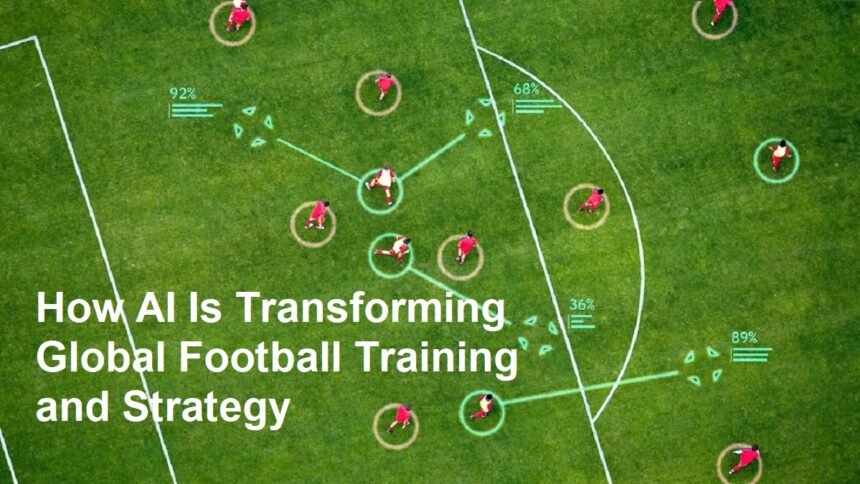Introduction: When Football Meets Artificial Intelligence
Football has always been about passion, instinct, and teamwork. But in the modern era, artificial intelligence (AI) is stepping onto the pitch—not as a player, but as a game-changer in training and strategy.
From sports data analytics that tracks every pass, sprint, and shot, to smart coaching tools that personalize workouts, AI is transforming how clubs prepare, how coaches strategize, and how players improve.
So, how exactly is AI shaping global football training and strategy? And what can fans, coaches, and even aspiring players learn from this tech revolution? Let’s break it down.
AI in Football Training: The Basics
What Does AI Really Do in Football?
AI in football training isn’t about replacing coaches—it’s about augmenting human expertise. By processing vast amounts of data, AI identifies patterns that humans might miss. Whether it’s analyzing player fatigue or predicting opponent strategies, AI provides data-driven insights for smarter decisions.
Why Football Needs AI Now
Modern football is faster, more competitive, and more physically demanding than ever. Coaches and clubs can no longer rely solely on gut instinct. Data-driven decision-making powered by AI gives them the edge they need.
Quick Tip for Coaches: Start small. Even free AI-driven tracking apps can help monitor player performance and improve training sessions.
The Role of Sports Data Analytics
Turning Numbers into Strategy
Sports data analytics powered by AI allows teams to break down every movement on the pitch. GPS trackers, wearables, and video analysis generate millions of data points. AI then processes these into actionable insights—like when a player is likely to underperform due to fatigue.
Real-Life Example: Predicting Injury Risks
By analyzing muscle strain, sprint intensity, and recovery rates, AI tools can predict when a player is at risk of injury. This helps coaches adjust training loads before problems occur.
Practical Tip for Athletes: If you’re training at a semi-professional or amateur level, consider wearable devices with AI-driven health insights to reduce injury risks.
Smart Coaching Tools: From Clipboard to Cloud
Personalizing Player Training
Gone are the days of one-size-fits-all drills. Smart coaching tools powered by AI create personalized training programs tailored to each player’s strengths and weaknesses. For example:
- Strikers can work on finishing angles based on past shot data.
- Midfielders can improve positioning using AI heatmaps.
- Defenders can learn better anticipation through predictive simulations.
Real-Time Feedback
With AI-driven tools, coaches can provide instant performance feedback during practice sessions. Video analysis powered by AI can highlight mistakes and suggest improvements right on the training ground.
Tip for Youth Coaches: Use AI-powered video breakdown tools (many are affordable) to help young players understand tactical concepts visually.
Tactical Intelligence: AI on the Sidelines
Opponent Analysis
Before every match, coaches spend hours analyzing opponents. With AI, this process becomes more precise. Algorithms study past matches, identifying patterns like pressing styles, formation shifts, or weaknesses under pressure.
In-Game Adjustments
AI-powered analytics can also run in real-time, helping coaching staff make tactical adjustments mid-game. Imagine receiving instant insights like:
- “The opponent’s left-back is leaving too much space.”
- “Your striker is losing stamina, time for a substitution.”
Practical Tip for Amateur Teams: While you may not have access to elite AI tools, using match analysis apps can still provide valuable insights into opponents and your own team’s performance.
How AI Benefits Players Directly
Improved Skill Development
AI can simulate scenarios for players to practice decision-making—such as choosing the best passing option under pressure.
Boosting Confidence
By tracking progress with clear data, players can see their improvement over time, which boosts motivation and confidence.
Mental Training
Some AI tools even help with psychological preparation, offering insights into focus levels and stress management.
Practical Tip for Players: Use AI-driven performance tracking apps not just for physical stats but also to monitor mental well-being and focus.
Challenges of AI in Football
Data Overload
One big risk is drowning in too much data. Coaches must learn to filter what’s useful and avoid overwhelming players with numbers.
Accessibility for Smaller Clubs
Elite clubs can afford the most advanced AI systems, but smaller clubs may struggle. Fortunately, more affordable AI coaching apps are emerging.
Ethical Concerns
Data privacy is another issue. Collecting health and performance data must be done responsibly, protecting players’ rights.
Practical Tip for Clubs: Always prioritize data security and transparency when adopting AI tools. Players should know how their data is used.
The Future of AI in Global Football
Looking ahead, AI’s role in football will only grow. We can expect:
- More immersive virtual training where AI simulates real-game scenarios.
- AI referees supporting VAR with even faster, more accurate calls.
- Fan engagement tools where supporters access AI-driven stats during matches.
In short, AI won’t just transform training—it will reshape the entire football ecosystem.
Conclusion: A Smarter Beautiful Game
The marriage of AI in football training and sports data analytics is no longer science fiction—it’s reality. From preventing injuries to perfecting tactics, AI is making football smarter, faster, and more strategic.
For players, it means personalized growth. For coaches, it means data-backed decisions. And for fans, it means watching a game that’s more intense, competitive, and dynamic than ever.
Your Turn: Do you think AI will make football more exciting—or take away the human magic of the sport? Share your thoughts in the comments below!












